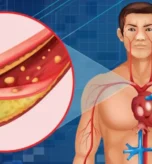
High triglycerides are more than a number on a lab test—they’re a stern warning signal from your body. High levels of triglycerides can actually dramatically raise your risk of heart disease, stroke, and metabolic syndrome. But the good news? You can regain control of your health using simple, natural methods that really work. In this blog, we’ll discuss 10 effective tips to naturally reduce triglycerides and enhance overall heart health—without having to completely depend on drugs.
1. Reduce Sugar and Refined Carbohydrates
Sugary drinks, white bread, croissants, and other processed carbohydrates quickly increase blood sugar, which the liver stores as triglycerides. Cutting back on added sugars and processed carbohydrates is one of the quickest methods to experience changes in your lipid profile.
Customizing an anti-cholesterol and antitriglyceride diet? Nutrition, diet, and health advice at your disposal from an acknowledged and qualified person at YelloMedi.
2. Choose Healthy Fats
Remember, fats are not all bad, contrary to the old maxim. Conversion of saturated fats and oils into unsaturated fats is a remarkable change in keeping triglycerides down and promoting heart health. Specifically, triglycerides are lowered through omega-3 fatty acids contained in fatty fish, i.e., salmon, sardines, and mackerel.
3. Shed That Unwanted Weight
Indeed, a slight decrease in body weight of about 5% to 10% can lead to large decreases in triglycerides. Visceral fat deposited around the belly is more harmful because it is directly associated with increased insulin resistance and triglycerides made by the liver.
4. Move Up the Physical Activity Chart
Exercise burns fat, lowers insulin resistance, and raises your HDL (good cholesterol), all of which help lower triglycerides. Strive to get at least 150 minutes of moderate-intensity physical activity per week, like brisk walking, swimming, or biking.
Your health journey begins here—discover personalized fitness plans at YelloMedi, where your health objectives take center stage.
5. Restrict Alcohol Intake
Alcohol contains a lot of sugars and calories and can result in a quick increase in triglycerides. For most individuals with elevated triglycerides, even moderate drinking is a provoker. If you’re really committed to reducing your numbers, consider not drinking or drinking every now and then.
6. Boost Fiber Intake
Soluble fiber promotes fat and sugar reduction in the digestive system to ensure healthier blood lipid levels. Oats and barley, legumes, fruits, and vegetables are all soluble-fiber-rich sources, and it is very important to have them in your diet.
7. Keep a Balance in Meal Timing and Sizes
Overeating, even if the food is healthy, can bring triglycerides and weight to you. Smaller, well-balanced meals during the day will help your insulin levels and keep your metabolism active. Stay off those late-night snacks and ensure there are no long gaps in meals throughout the day.
8. Set Your Sights on Trans Fats
Artificial trans fats (commonly used in margarine, fried foods, and processed snacks) increase LDL cholesterol and triglycerides and decrease HDL cholesterol. These are especially harmful to the heart and must be avoided completely in your diet.
Your heart is worth the best. Schedule a health consultation today with YelloMedi and start a triglyceride-reducing lifestyle.
9. Drink Right with the Proper Beverages
Fizzy drinks, sweet tea, and energy beverages tend to contain high amounts of simple sugars that raise triglycerides. The best liquids are water, green tea, and herbal teas; they satisfy thirst and aid metabolism. Plain water can be infused with citrus or cucumber oils for a refreshing, healthy drink.
10. Stay Calm and Sleep Well
Long-term stress and bad sleep disrupt hormones, increase the level of cortisol, and indirectly raise triglycerides. Meditation, yoga, journaling, or a calming walk in nature can work wonders to reduce stress. Keep sleeping for 7–8 hours every night to allow your metabolism to stay on track and keep your heart healthy.
Wrapping Up
High triglycerides are a treatable risk factor if one is ever willing to face life-altering, constant lifestyle choices. Eating the right foods, exercising regularly, lowering stress, and quitting bad habits will go a great way toward a healthy heart and a longer lifespan.
Don’t forget, there is no one-size-fits-all approach. Always consult with a healthcare professional or nutritionist for specific advice based on your unique needs.
Ready to become the master of your own health? Partner with specialist nutritionists and well-being coaches at YelloMedi to create your personal roadmap to well-being.
Your body will appreciate it—begin your transformation today with YelloMedi.







